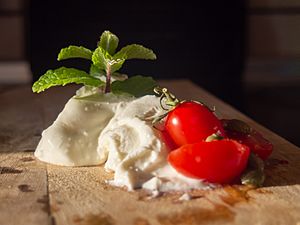Katiki Domokou facts for kids
Katiki Domokou (pronounced Kah-TEE-kee Doh-moh-KOO) is a special kind of cheese from Greece. It's made from a mix of goat and sheep milk. This cheese comes from a town called Domokos in the Phthiotis region of Greece.
It's known for being white, soft, and having a low amount of fat. It's a traditional product that has a "protected designation of origin." This means it can only be called Katiki Domokou if it comes from this specific area and is made in a certain way.
Contents
What is Katiki Domokou?
Katiki Domokou is a fresh, soft, white cheese. It's a healthy choice because it has less fat compared to many other cheeses. For every 100 grams of this cheese, there are about 169 calories. It also contains about 10 grams of protein and 13 grams of fat. This makes it a good addition to a balanced diet.
How is Katiki Domokou Made?
This unique cheese is made from pasteurized milk. Pasteurization is a process that heats the milk to kill any harmful bacteria, making it safe to eat. What's interesting is that this cheese curdles without using rennet. Rennet is a substance often used to make cheese firm. Instead, the milk naturally thickens. After it curdles, the cheese is drained in special cloth bags. This process helps remove extra liquid, giving the cheese its soft texture.
Where Does it Come From?
The home of Katiki Domokou cheese is the town of Domokos in the Phthiotis region of central Greece. The specific climate and local traditions in this area help create the unique taste and texture of the cheese. Because it has a "protected designation of origin," only cheese made in this region following traditional methods can use the name. This protects its quality and heritage.
How Can You Enjoy It?
Katiki Domokou is very versatile, meaning you can use it in many ways!
- You can spread it on toast for a quick snack.
- It's delicious on dakos, which is a traditional Greek bruschetta.
- It makes a great addition to fresh salads.
- You can also use it as a tasty filling for pitas, which are savory pastries.
You can find this cheese in many supermarkets, making it easy to try!
See also
 In Spanish: Katiki Domokou para niños
In Spanish: Katiki Domokou para niños
 | Charles R. Drew |
 | Benjamin Banneker |
 | Jane C. Wright |
 | Roger Arliner Young |


